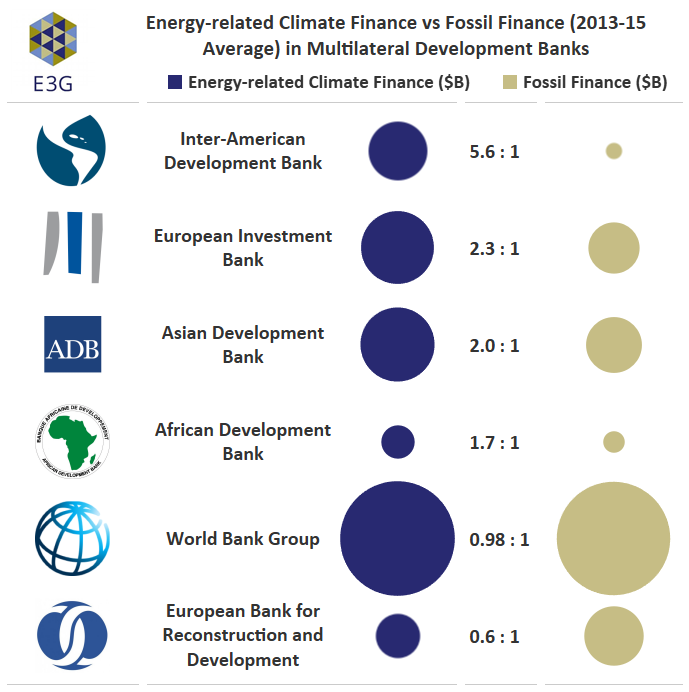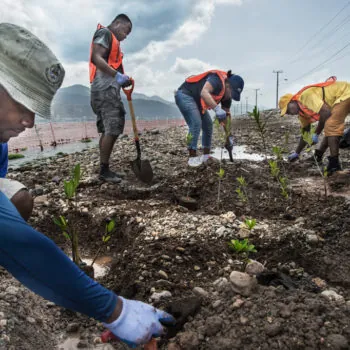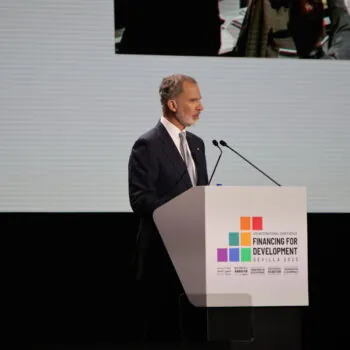Today, on the eve of the 2017 Annual Meetings of the World Bank Group and International Monetary Fund, E3G and Oil Change International have launched briefings showing that, while some multilateral development banks are making good progress on climate action, many are still financing billions of dollars in fossil fuel projects despite mounting climate impacts and global commitments like the Paris Agreement reached in December 2015.
Both briefings are part of the Big Shift Campaign, a global effort composed of dozens of civil society organizations encouraging government-backed multilateral development banks to reinforce the aims of the Paris Agreement and commit to a shift from fossil fuel finance to clean energy finance.
Key Findings:
- Government-backed Multilateral Development Banks (MDBs) are not greening their investments fast enough. While overall spending on climate-related activities is higher than on fossil fuels, there is still a lack of progress in phasing out fossil fuel investments and increasing climate finance.
- MDBs approved over $5 billion in fossil fuel finance in 2016, despite the Paris Agreement being reached in December 2015, analysis by Oil Change International shows.
- The Inter-American Development Bank is a leader among MDBs, with the highest green-to-brown ratio. The European Bank for Reconstruction and Development and the World Bank Group have emerged with the lowest green-to-brown ratio among MDBs, E3G analysis shows.
- E3G analysis found that some projects reported as climate finance were in fact fossil fuel projects instead. The European Bank for Reconstruction and Development provided funding to an offshore gas exploration project in Azerbaijan, the Lukoil Shah Deniz Stage II project, and counted $10m as climate finance.
- As a first step towards phasing out support for oil and gas, both newly released briefings conclude that MDBs should stop all remaining support for coal and commit to ending finance for exploration of fossil fuels. The African Development Bank and Asian Development Bank have already excluded financing for fossil fuel exploration based on financial risks, and the other MDBs should follow suit.
Quotes:
Dr. Helena Wright, Senior Policy Advisor at E3G and co-author of the E3G report, said:
“While some progress has been made, development banks must do more to green their investments. As a first step, the banks should commit to ending finance for fossil fuel exploration and provide transparency about project emissions.”
Alex Doukas, Stop Funding Fossils Program Director at Oil Change International and co-author of the Oil Change International report, said:
“This year's massive hurricanes in the Atlantic and Caribbean and devastating floods in South Asia should be a wake-up call to the World Bank and other institutions who claim to care about climate change. If they really want to help lift people out of poverty, taxpayer-funded banks can no longer finance climate destruction, which is killing thousands and making the poor poorer. They must stop funding fossils."
Notes to Editors:
- The Big Shift Campaign is a coalition of more than 30 national, regional, and international organisations calling on the World Bank to shift its investments from fossil fuels to clean energy and to provide much greater transparency about the impact that investments in energy are having on the lives of men, women, and children.
- E3G is an independent climate change think tank operating to accelerate the global transition to a low carbon economy. E3G specializes in climate diplomacy, climate risk, energy policy and climate finance.
- Oil Change International is a research, communication, and advocacy organization focused on exposing the true costs of fossil fuels and facilitating the coming transition towards clean energy.
- The World Bank’s directors convene for their annual meeting in Washington, D.C., from October 13 to 15.
- MDBs, including the World Bank, will play a crucial role in delivering climate finance and helping countries transition to low-carbon economies.
- According to their own estimates, the six largest MDBs committed more than $25 billion in climate finance in 2015 from their own resources. Recent analysis shows however, that MDBs continue to support fossil fuels. In fact, over the three most recent fiscal years, they’ve provided more finance to fossil fuels than clean energy.
Ratio of Energy-related Climate Finance to Fossil Finance Directed to Developing Countries (2013-15 Average), from High to Low:

Sources: In the infographic, energy-related climate finance data is from the OECD-DAC database; Fossil finance data is from Oil Change International


